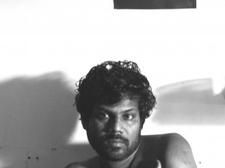 The Best Untranslated Writers series – in which established writers select and showcase fellow writers from their own languages who are not yet widely translated or read – began with a trio of Brazilians on the writers they love most but are yet to make the leap into English. Today V.V. Ganeshananthan introduces us to Shobaskathi, also known as Anthony X, who writes about Sri Lanka and its diaspora communities, and who was previously involved in the Liberation Tigers of Tamil Eelam. Shobasakthi is also known as Anthony X; he is an ex-militant; he is an expatriate. Based in France, he writes about Sri Lanka in Tamil, his native language (and the native language of my parents). I read Tamil, but not yet well enough to get through the original versions of his books; instead, I use popular English translations by Anushiya Ramaswamy. I finished his novel Gorilla very shortly before meeting him; I read another, Traitor, many years after that initial conversation.
The Best Untranslated Writers series – in which established writers select and showcase fellow writers from their own languages who are not yet widely translated or read – began with a trio of Brazilians on the writers they love most but are yet to make the leap into English. Today V.V. Ganeshananthan introduces us to Shobaskathi, also known as Anthony X, who writes about Sri Lanka and its diaspora communities, and who was previously involved in the Liberation Tigers of Tamil Eelam. Shobasakthi is also known as Anthony X; he is an ex-militant; he is an expatriate. Based in France, he writes about Sri Lanka in Tamil, his native language (and the native language of my parents). I read Tamil, but not yet well enough to get through the original versions of his books; instead, I use popular English translations by Anushiya Ramaswamy. I finished his novel Gorilla very shortly before meeting him; I read another, Traitor, many years after that initial conversation.
In Gorilla (not Guerilla, as some think!), he draws heavily on his own experiences as a member of the Liberation Tigers of Tamil Eelam (he has dubbed the book ‘autofiction’). The book found a solid audience in South Asia, but doesn’t have as wide a readership in the West. It’s a gem, full of characters engaged in political and moral contradictions and conflict; the story was one of the first to bring Shobasakthi a measure of fame, not only as a talented fiction writer, but also as a political dissident and critic of the Sri Lankan state and his former outfit, the LTTE.
Shobasakthi’s work is characterized by a dark playfulness. Traitor, the second book I read, has a different title in Tamil – one that would translate to ‘Mmmm’ or ‘Hmmm’ (Ramaswamy uses the latter when the word appears in text – often at the end of a chapter or anecdote related by the narrator). This sound signals a kind of laziness, a laissez-faire politics in which one listens to the story, but takes no action. It’s akin to ‘ah’ maybe, or ‘that’s how it is’ (I imagine it accompanied by the parabolic yes-no-neither-head-nod common to some South Asian conversations). It’s a recurring, disturbing refrain throughout the story – a subtle reminder of the long-term political and social costs of fear and inaction (I recommend avoiding reading the jacket copy, which should come with a spoiler alert – I began the book with a very good sense of how it would end).
In both books, politics operates not only in the world at large, but also through family relationships and power structures. I admire the powerful humour and unrelenting challenge of his work, as well as its deep engagement with two of my own favourite subjects: Sri Lankan history and politics.
Shobasakthi also participated in a film called Sengadal— The Dead Sea; he appears in the film as one of its main characters, and was also one of its writers. The film, which is available in Tamil and also subtitled in English, is the debut feature of Chennai-based filmmaker Leena Manimekalai.
The Best Untranslated Writers series continues here: with three of our Best of Young Brazilian Novelists, Michel Laub, Laura Erber and Ricardo Lísias who give introductions to the work of Brazilians Daniel Pellizzari, André Sant’Anna and José Luiz Passos respectively.
Courtesy: http://www.granta.com/New-Writing/Best-Untranslated-Writers-Shobasakthi